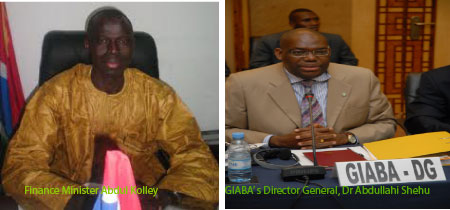
Gambia’s Finance Minister Abdou Kolley has said Money Laundering and Terrorism Financing are evils that are capable of destroying governments’ development efforts.
At a two-day regional seminar for journalists by the Inter-Governmental Action Group against Money Laundering in West Africa (GIABA) held on 28 and 29 June this year at the Laico Atlantic Hotel in Banjul, Finance Minister Kolley said money laundering and terrorism financing are twin evils that are capable of destroying all great and development efforts by governments.
GIABA’s recognition of the role that journalists can play in exposing such evils, with a deep sense of patriotism, is therefore testamentary to the need for collaborative, complementary and concerted efforts from all stakeholders, in order to root out these evil practices, the finance minister noted.
On behalf of the government, he said: “Be rest assured that, on its part, the Government of The Gambia will continue to ensure that the enabling environment to uphold the rule of law and justice is nurtured, along with the support to all stakeholders to carry out their duties in a responsible manner.
“Money Laundering is a crime that is complex and not easy to detect and contain. It is a menace causing serious consequences on political, social and economic development and the globe and no nation is spared.
“As we all know, this criminal activity is usually fuelled by corruption and greed thus undermining sustainable development aspirations of nations are mainly utilised to sponsor illegal activities in society.”
Money laundering, Minister Kolley says further, impairs development of democratic, finance, education, and health institutions.
He commended GIABA for conducting the workshop for journalists since they are a critical sector in the fight against money laundering and terrorism financing in the region.
Robust communication and advocacy programmes are required to enlighten all strata of society, he noted, saying such workshop and seminars would help in training competent and experienced journalists who would have a general knowledge of Anti-Money Laundering and Counter Terrorism Financing (AML/CFT) framework, assisting participants to produce reports and articles/features of quality AML/CFT issues, and improving and expanding the network of journalists to disseminate truthful information on the AML/CFT mechanisms.
“The fight against economic and financial crimes is a herculean task requiring concerted, coordinated, cooperative and collaborative efforts by all stakeholders, each with distinct but complimentary role,” Minister Kolley noted, saying: “Unfortunately, the outcome of the mutual evaluation assessment reports on ECOWAS countries show low level of compliance with international AML/CFT standards; a case in point is the Financial Action Task Force (FATF) 40+9 Recommendations.
“We recognize that this was due to poor understanding of the AML/CFT requirement, but efforts are being taken to address this misunderstanding.
“Also, central to the AML/CFT regime is the mass media, particularly with regard to the dissemination of information on these scourges affecting the economy as well as the propagation of best practices on AML/CFT, hence the timelines for this collaborative sensitization seminar by GIABA.”
Money laundering is a complex phenomenon which can generate severe consequences on political, social and economic development of any country.
Recognising the scale of the problem and its impact on the soundness of the financial and economic activities in the world and considering its negative impact on promoting crime and crime-related activities has made it highly essential for concerted efforts to be taken to combat the menace.
In light of this situation, the director of Financial Supervision at the Central Bank of The Gambia, Essa Drammeh, said in his presentation at the two-day seminar: “In The Gambia, the Money Laundering Act (MLA) 2003, and the anti-Terrorism Act 2002 are the main legislative instruments to fight money laundering and terrorism financing.
“Following the enactment of the Law, the Central Bank was required to set up Financial Intelligence Unit (FIU) to implement the MLA 2003 Act. The FIU was established in 2007 housed in the Financial Supervision Department of the Central Bank of The Gambia. Since the establishment of the FIU, Financial Institutions have been reporting Suspicious Transaction Reports which are analysed and intelligent reports sent to the law-enforcement agent (the Police) for further investigation.
“A detailed Customer Due Diligence Guidelines was designed and is being implemented by financial institutions. On-site examinations are being conducted on financial institutions to assess their compliance with the Money Laundering Act 2003, Know Your Customer (KYC) requirements and with other international best practices.”
The Gambia was subjected to a Mutual Evaluation by GIABA in 2008 which report highlighted a number of shortcomings in the Anti-Money Laundering and Counter Terrorism Financing regime of the country, notably deficiencies in the Law.
“I am glad to report that the National Assembly in 2012 legislative session, [on 27 June 2012], passed the Anti-Money Laundering and Counter Terrorism Financing Bill 2012 into law. The new law will address most of the deficiencies highlighted in the GIABA 2008 Mutual Evaluation Report,” Mr. Drammeh said.
One of the important activities of GIABA since its inception is the delivery of relevant training programmes aimed at stemming the tide of money laundering and terrorist financing in the West Africa region.
These range but are not limited to different professional groups like the judiciary, anti-corruption agencies, compliance officers of banks, prosecutors and lawyers, designated non-financial businesses and professions (DNFBPs), journalists among others, said Dr Buno Nduka who represented GIABA’ s Director General, Dr Abdullahi Shehu, at the seminar.
“The media plays a vital role in awareness raising and disseminating of AML/CFT messages,” he noted. “Therefore, this seminar is one of the strategies of achieving the mandate of GIABA, which is to protect the national economies and financial systems of member states from the laundering of proceeds of crimes.”


